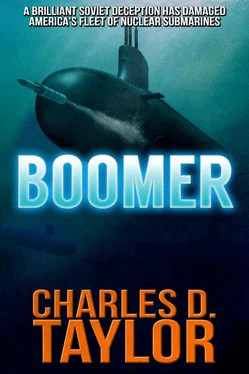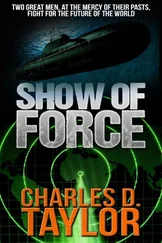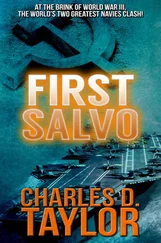“The chief tells me he can do it a hell of a lot faster.”
“That’s when we don’t have any observers aboard with their goddamn checklists. Seven minutes is what we tell the paper pushers in the commodore’s office. They like doctrine. When the chief’s not running by the book, then it’s really something. Oh, shit,” he exclaimed happily, “you ought to see them when we’re going through an attack sequence — setting up the target solution, firing, maneuvering to avoid counterfire. Christ. Ben Steel drives this thing like a race car, diving, high-speed turns, everything. Then he’s calling down here for the next firing run, never figuring that all these guys have had a chance to do is hold on for dear life. And the chief almost always tells him he’s got at least two tubes ready.” He slapped the side of one of the torpedoes and pushed his glasses back again. “You’d love it,” he said hoarsely.
Burch asked the chief, “How about it? I’m an odd man out on this boat. Need an extra body if the shooting starts? Maybe we can break your record.”
“Well, sir, I figure we’re faster than any boat in SUBPAC now. When the XO reported aboard he promised me we’d be the fastest because he said there was no reason for a submarine if we couldn’t sink everything that came anywhere near us.” He winked at Burch. “He also said I’d end up on shore duty on some ice station counting polar bears if we weren’t the best. What do you think, XO?”
“Not only are you now the best, Chief, you have just been given the opportunity of hiring a SEAL to improve on that. I’ve always had a love affair with these guys myself.”
“You’ve got a deal, sir.” The chief reached across the torpedo to shake Burch’s hand. “Think we’re going to be able to use these babies, XO?”
“That’s a promise, Chief.” Then the XO headed back toward the control room, knowing be would find Steel close by in sonar.
Ben Steel was peering over a sonarman’s shoulder and he sensed his XO’s presence rather than heard him. He removed the large set of sonar headphones and hunched his back to stretch tight muscles. “I was looking for you a minute ago, XO. ID the torpedo room again?”
“The only place on this ship that smells better is the galley, and I sure as hell have been trying to avoid that place,” Simonds answered. “What’s up, Captain?”
“Nothing other than prying, even though I know the job’s already been done. Maybe it’s nerves in my old age.” Steel cocked his head to one side. “Any new and interesting sounds we’re sending through the hull to the curious?”
“Not a thing. This old boat’s quiet as the proverbial church mouse. The way we’re creeping along, we’d have to be clanging away on that church bell to attract any attention.” He pushed his glasses back on his nose. “We covered every inch of the ship, Captain.” As self noise was reduced, even those sounds normally unnoticed by humans, sensor detection range increased. Aboard SSBN’s a computer identified every self noise other than those in the baseline survey.
“Like I said, nerves. My apologies. Honest, I’ll try not to ping on you again, XO.”
“Never say that, Captain. Not at a time like this. Just one time one of us overlooks something that’s chewing on us, that might be the fatal mistake.” Simonds noticed Moroney, the sonar chief, eavesdropping, and waved an index finger at him in the dark, blue-lighted room. “How many stories can the greatest sonarman in the world tell us about that one little mistake someone made that told you they were out there?”
“These ears have heard more than you’d ever care to know, Mr, Simonds. The hiss of a beer can at a hundred yards.…”
“Don’t remind me, Chief. You’re bringing tears to my eyes.” He nodded toward Steel. “The chief’s got a good point there, Captain. Manmade sound. That’s the only thing I can’t guarantee. If we’re going to give ourselves away, it has to be something like that. We’re as tight as a tick otherwise.”
“Okay, We’ll take that opportunity away from the bad guys. Why don’t you secure the galley for now, except for sandwiches, of course? Have the cooks get everything they need out of the reefer now. Then they haven’t anything to play with but a few knives, that sort of thing. Pass the word through each compartment that regular meals have been secured, and keep the sandwiches rolling for anyone to grab when they’re hungry. No maintenance — so no tools adrift. If anyone has a problem that needs fixing, they ask your permission first. We’ll continue the current watches until sonar picks up something solid.” Steel wrinkled his forehead and rubbed tired eyes as he settled the headphones back over his ears. “Maybe some of the crew’ll catch up on their sleep.”
* * *
The process of finding out how much the Americans already knew about the fate of their boomers was indeed complex, much more complex than the KGB director could explain to the General Secretary.
Assuming the three Washington admirals would eventually end up in Hawaii at SUBPAC headquarters, operatives in Honolulu were ordered to undertake a painstaking search. Eventually, once it was agreed that the Americans had thrown them off the trail by avoiding easily traceable military transportation, it was a process of elimination among civilian passenger agents. They learned that the Chief of Naval Operations had arrived from Seattle. The Director of Naval Nuclear Propulsion had been on a flight from San Francisco. The Assistant CNO for Undersea Warfare had come from Washington. He’d also rented a car. All traveled in civilian clothes, using the names of enlisted men who had arranged reservations for them. The trail ended at the gate to the sub base. But it was enough to substantiate their assumption that the elimination of U.S. ballistic-missile submarines was indeed a probability. So many senior admirals on the hoof in the same place was a rarity, indicating an emergency of some kind.
Analysis of the message traffic concerning the SSBN’s once again was based on assumption. Considering the sheer volume of military communications over any twenty-four hour period, it was akin to untying a Gordian knot — and there was no opportunity to slash away at it with a great sword. There is a statistical possibility of breaking any code, though the probability lessens proportionately to security requirements, it was known that one-time codes, which were in the possession of only the people utilizing them, were being employed. In essence, that meant that the actual use of the code for breaking a message also resulted in that code’s destruction. Luck would have a great deal to do with finding even a single word in such a message.
The most talented individuals in the Soviet Union dropped whatever they were doing to take part in the process. Mathematicians, engineers, computer scientists, linguists, and those few mavericks who possessed a natural bent toward code breaking were called upon to prove what the Kremlin power structure wanted to confirm — that their orders had actually been carried through and that in all probability they had been successful.
Four admirals disappearing within the Hawaiian naval base seemed to indicate success. The amount of high-priority message traffic from and to specific commands seemed to acknowledge it. Even the use of so many unknown codes substantiated it. But it was a simple American voice communication to an Air Force intelligence aircraft closing SSV-516 that seemed to confirm their suspicions. That voice was intercepted not by SSV-516 but by a remote communications facility in Siberia. It ordered a KC-135 tanker aircraft to rendezvous with the Air Force plane regardless of the weather conditions. The pilot of the KC-135 was told in no uncertain terms that his mission would have grave impact on national security and must be completed regardless of hazard to personnel and equipment. It was that single voice message that convinced the KGB director and the General Secretary that Washington was indeed working very hard to disguise a critical situation, for refueling in that weather was certain suicide.
Читать дальше












